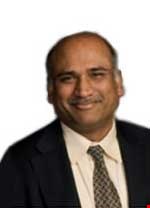Academic Keynote Speakers

Prof. Angappa Gunasekaran
Dean of School of Business and Public Administration (BPA)
California State University, Bakersfield,USA
Biography Dr. Angappa Gunasekaran is the Dean at the School of Business and Public Administration, California State University, Bakersfield (USA). Prior to this, he held the position of Dean and Professor at the Charlton College of Business from January 1, 2013 to June 30, 2017, Chairperson of the Department of Decision and Information Sciences from 2006-2012 and Founding Director of Business Innovation Research Center (BIRC) from 2006-2017 at the University of Massachusetts Dartmouth (MA). Dr. Gunasekaran has held academic positions at Brunel University (UK), Monash University (Australia), the University of Vaasa (Finland), the University of Madras (India) and the University of Toronto, Laval University, and Concordia University (Canada). He has a PhD in Industrial Engineering and Operations Research from the Indian Institute of Technology (Bombay). Dr. Gunasekaran has received Thomas J. Higginson Award for Excellence in Teaching (2001-2002) within the Charlton College of Business. He has over 300 articles published/forthcoming in 40 different peer-reviewed journals. He has presented about 50 papers and published 60 articles in conferences and given a number of invited more talks in about 20 countries. Dr. Gunasekaran is on the Editorial Board of over 30 peer-reviewed journals which include some prestigious journals. He has edited a couple of books. Dr. Gunasekaran is the Editor of Benchmarking: An International Journal and the North-American Editor of the International Journal of Enterprise Network Management. Dr. Gunasekaran is currently interested in researching benchmarking, agile manufacturing, management information systems, e-procurement, competitiveness of SMEs, information technology/systems evaluation, performance measures and metrics in new economy, technology management, logistics, and supply chain management.
 Prof. Rudolf Kruse (IEEE Fellow)
Prof. Rudolf Kruse (IEEE Fellow)
Institute for Intelligent Cooperating Systems (IKS)
Otto-von-Guericke University of Magdeburg, Germany
Biography: Rudolf Kruse is Professor at the Faculty of Computer Science in the Otto-von-Guericke University of Magdeburg in Germany. He obtained his Ph.D. and his Habilitation in Mathematics from the Technical University of Braunschweig in 1980 and 1984 respectively. Following a stay at the Fraunhofer Gesellschaft, he joined the Technical University of Braunschweig as a professor of computer science in 1986. Since 1996 he is a professor in the Computational Intelligence Group in Magdeburg. He has coauthored 15 monographs and 25 books as well as more than 350 peer-refereed scientific publications in various areas with 16000 citations. He is associate editor of several scientific journals. Rudolf Kruse is Fellow of the International Fuzzy Systems Association (IFSA), Fellow of the European Association for Artificial Intelligence (EURAI/ECCAI ), and Fellow of the Institute of Electrical and Electronics Engineers (IEEE). His group is successful in various industrial applications in cooperation with companies such as Volkswagen, SAP, Daimler, and British Telecom. His current main research interests include data science and intelligent systems.
 Prof. Antonella Ferrara (IEEE Fellow)
Prof. Antonella Ferrara (IEEE Fellow)
University of Pavia, Italy
Biography: Antonella Ferrara received the M.Sc. in Electronic Engineering (cum Laude) in 1987 and the Ph.D. in Computer Science and Electronics in 1992 from the University of Genova. After being a Faculty Member at the University of Genova (1992-1998) shejoined the University of Pavia in 1998 as an Associate Professor. Since January 2005 she has been Full Professor of Automatic Control in the Department of Electrical, Computer and Biomedical Engineering (ECBE) of the same university. She teaches “Process Control and Robotics”, “Advanced Automation and Control” and “Control of Vehicles Dynamics”. She was Visiting Professor at Graz University of Technology, and Invited Lecturer at Harvard University, University of Minnesota, University of California at Los Angeles (UCLA), University of Stuttgart, Technical University of Delft, INRIA Grenoble, King Abdullah University of Science and Technology (KAUST), Jeddah, Hanyang University, Seoul, and Universidade Federal do Rio de Janeiro, Brazil. Her research activities are mainly in the area of automatic control of complex systems, with application to automotive systems, robotics, power networks and vehicular traffic. She is particularly interested in autonomous driving and coordinated control of vehicles. She was coordinator of the Italian research team in the European Projects ITEAM (Interdisciplinary Training Network in Multi-Actuated Ground Vehicles, Marie Skłodowska-Curie Action, 2016-2019). She was scientific leader of several research projects funded or co-funded by companies. She has authored or co-authored more than 380 scientific papers, with 125 international journal papers and 3 books. Moreover, she contributed, with invited chapters, to several edited books. She was Associate Editor of the IEEE Transactions on Control Systems Technology, IEEE Transactions on Automatic Control and IEEE Control Systems Magazine.She is currently Associate Editor of Automatica and IEEE Transactions on Intelligent Vehicles, as well asSubject Editor of the International Journal of Robust and Nonlinear Control. She wasappointed and elected member of the Board of Governors of the IEEE Control Systems Society (2012; 2016-2018), and member of the European Control Association (EUCA) Council (2015-2019). She is Chair of the EUCA Conference Editorial Board and Series Editor of the book series “Advances in Industrial Control” published by Springer.Antonella Ferrara is IEEE Fellow (Class 2020), member of the IEEE Control System Society and the IEEE Intelligent Transportation Systems Society, as well as member of several IEEE and IFAC technical committees.
Title: Classical and Emerging Topics in Road Traffic Control
Abstract: The scientific, technological, social and economic impact of successful research in road traffic control is very significant, with immediate effects on safety, quality of life, environment, use of energy resources, and transportation costs. Yet, the development of effective methods and algorithms for road traffic management has to face notable methodological challenges. In addition, the type of traffic control strategies developed so far, the “classical approaches”, such ramp metering and variable speed limits, need now to be updated and adapted to consider the fast development in automotive technologies, traffic sensors, data processing, and communications. This plenary talk will address all these aspects, starting from an overview of classical traffic modelling and control concepts, to arrive at encompassing emerging research trends at different scales: from the management of very large and complex traffic networks to the control of individual connected and automated vehicles, in order to have a beneficial influence on macroscopic traffic dynamics.
Industry Keynote Speakers
More Information ComingSoon…
